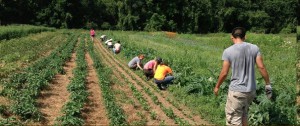Bringing Hands-on Learning About Local Foods to the Classroom in NY
Continuing our exploration of the connection between schools and local food, we talked with Tina Chan Sweenie, a mom of three living in the Hudson Valley, NY. Tina shares her thoughts on the importance of the Beacon Farm to School Collaborative.
Hi Tina! Can you tell us a bit about the Beacon Farm to School Collaborative?
The Beacon Farm to School Collaborative is a group that brings hands-on learning about food and healthy choices to the classroom. The Collaborative consists of three organizations; Common Ground Farm  (http://www.commongroundfarm.org/), Hudson Valley Seed (http://hudsonvalleyseed.org/) and Hudson Valley Farm to School (http://www.hvfs.org/).
(http://www.commongroundfarm.org/), Hudson Valley Seed (http://hudsonvalleyseed.org/) and Hudson Valley Farm to School (http://www.hvfs.org/).
They approached the Beacon School Board of Ed with the idea of educating our children about where their food comes from, how a child can make personal choices about their own health and see first hand what happens to a vegetable from seed to bowl.
Thanks to a United Way Grant, JV Forrestal Elementary School was the first school in the district and Dutchess County to roll-out a full year, Farm to School program. This program includes monthly visits from the farmer in the classroom, a chef that does lessons and cooks a meals in the classroom and weekly visits to the garden that was created in their own playground. It’s an amazingly fun way to teach our kids about eating their vegetables.
Why is the program important for your kids? What impact does it have on them?
This program is important on so many levels. As parents, we work hard to teach our kids about the their choices. We try to educate our kids about healthy eating and we hope that resonates in their place of learning, as well. We’ve had experiences where our daughter has been given Doritos and packaged Rice Crispy Treats at her schools at snack time. Which completely negates the importance of our beliefs. It would be fine if it were a special treat, but not something that can happen on a regular basis. We send our kids to school to learn and sadly, this is part of the lesson. These snacks are used because it’s easy, a non-perishable and inexpensive, but that can’t always be the argument. It is a significant lesson to first, know what a vegetable is, but to then understand how it grows is a completely different teaching. Farming is a excellent vehicle to help kids understand why not to waste food. It takes effort and time to grow something healthy, that eventually you will eat. The farmers also show our children that there is no need for the use of pesticides in planting and farming.
Processed foods - the idea of cooking from scratch because we don’t have time has become the norm. We all do it. We have a generation of people that don’t really know how to cook because it wasn’t or isn’t taught at home anymore. Simplicity of foods has become so tainted that we need to have soy, high fructose corn syrup or additives in everything we eat.
This program helps our children break it all down. The Beacon Farm to School Collaborative focuses on one vegetable per month. They produce one recipe a month and couples the lesson with an all-school taste test. All the while, getting their little hands in the dirt, picking, cutting vegetables and preparing a communal meal. Not to mention, an entire school’s worth of children are trying new foods. Not that everyone has to try the monthly taste-test meal, but children are watching their friends. It’s becoming common place to taste the dish and then discuss what they are eating.
What impact does this have on your family?
My daughter is excited and has fun with all of this. Yes, we do our own planting in our garden and we eat our own vegetables, but she gets to do it with her friends at school. Which, let’s face it, is a lot cooler. They share a sense of community working together and take pride in what they have created. That comes home as well, Leila teaches her sister about kale and then shares with us, ideas like three sister farming. She would like us to use the technique in our garden at home during the next planting season.
Most satisfying, is that The Beacon Farm to School Collaborative is reinforcing what we are teaching at home.
What are your thoughts on the relationship between farms, schools and families? Why is this important?
This program not only speaks to our beliefs, as parents, but more importantly the direction in which schools can work toward. The Farm to School Programs, if extended beyond a few schools here in the Hudson Vally to a nation, can directly effect America’s obesity issues. Taken further, the Farm to School Programs can directly effect health insurance and the economy. This can be part of a greater preventative care initiative for our nation’s healthcare problems. We can’t look at ourselves as individuals, it’s about community as a whole. We should be able to take care of ourselves and our community around us. Seems crazy to think that a simple program created by three women, in the Hudson Valley, in the town of Beacon at the JV Forrestal Elementary School could have a greater effect on society. By looking at Farm to School programs on a macro level, we can only hope more of these projects can and will change the mentality and the mindset of individuals that will grow to have a healthier outlook on their food choices and respect for where it came from.
This type of education works. Ask local legend, Pete Seeger. I was one of many, in his Weed Wallows program as a child. His teaching, as well as that of other educators, fostered a generation to look at the environment and the Hudson River in completely unconventional way. It starts young and has the ability to stay with the person.
How and why is food important to your family? What else are you as a mom doing to keep your family healthy?
I am a Chinese American who grew up in Manhattan. We had access to Chinatown, that offered fresh fruits and vegetables. My mother spent every evening cooking meals from scratch. It came down to finances, for us, it was less expensive and healthier. Even with soccer practice, track, newspaper, yearbook, etc, between myself and my sisters, we always had a sit down dinner. This was also true with my husband’s family. It stuck with us and it’s become an important part of our lives, as well.
Here in the Hudson Valley, we are lucky to have plenty of farms and CSAs. As I mentioned before, we also grow our own and preserve what we can for the rest of the year. That comes from a love of planting and the need for healthier living. My husband’s father and grandfather both passed away in their forties of heart disease. We really like having my husband around.
We also quite enjoy food and cooking. When we travel, we usually eat our way through a city or country. Meals in any society allows for insight into a culture. Food is a time when people come together; it’s community. We also take time to share and explain our food to our kids, to have them appreciate what they are eating as well. It gets infused in their everyday and we can see it when they play CSA in their club house or when they pick a random assortment from our garden and we make a spontaneous dish with everything they have picked.
Lastly, we like to stay active. We landed in Beacon because we are sandwiched between Mt. Beacon and the Hudson River. This allows for a ton of outdoor time. Our backyard was the deciding factor when we found our home, the kids had room to play. We’re the one’s always out working in the garden and the children are more than likely naked in the dirt.
**
Also check out Local Farms Bind Us as a Community to hear more about the connection between local farms and schools.
Find out more about MomsRising.org's work around healthy food at: http://www.momsrising.org/page/moms/school-foods-making-the-school-day-h...
And find out more about the USDA's Farm to School Program on their website: http://www.fns.usda.gov/farmtoschool/farm-school

The views and opinions expressed in this post are those of the author(s) and do not necessarily reflect those of MomsRising.org.
MomsRising.org strongly encourages our readers to post comments in response to blog posts. We value diversity of opinions and perspectives. Our goals for this space are to be educational, thought-provoking, and respectful. So we actively moderate comments and we reserve the right to edit or remove comments that undermine these goals. Thanks!